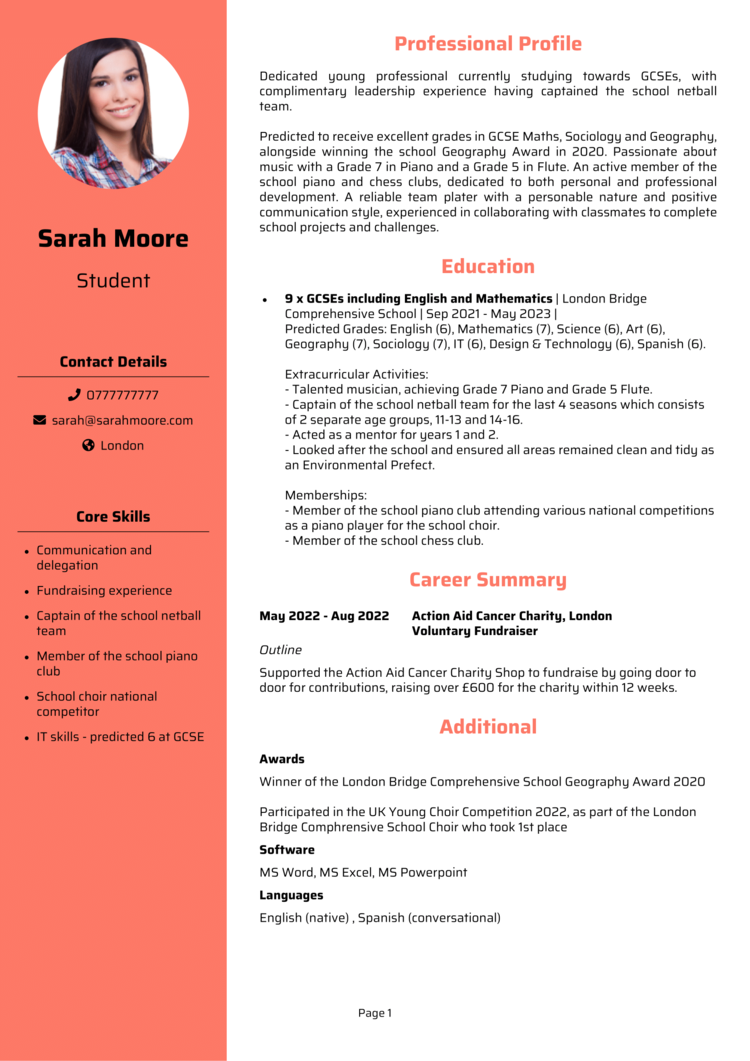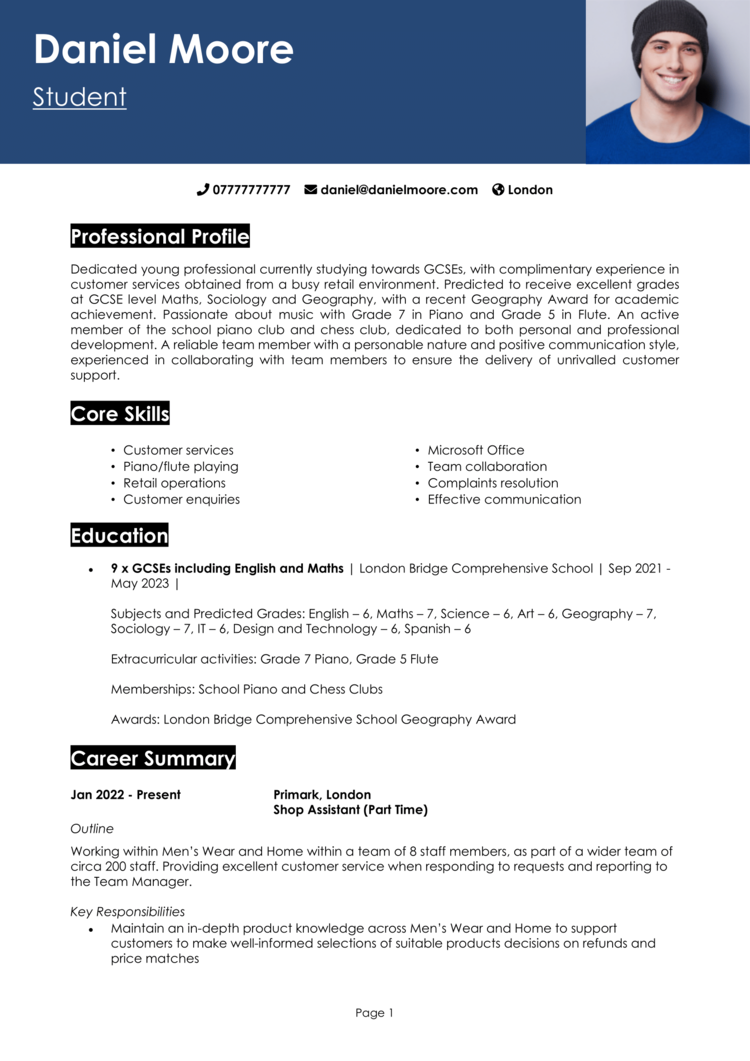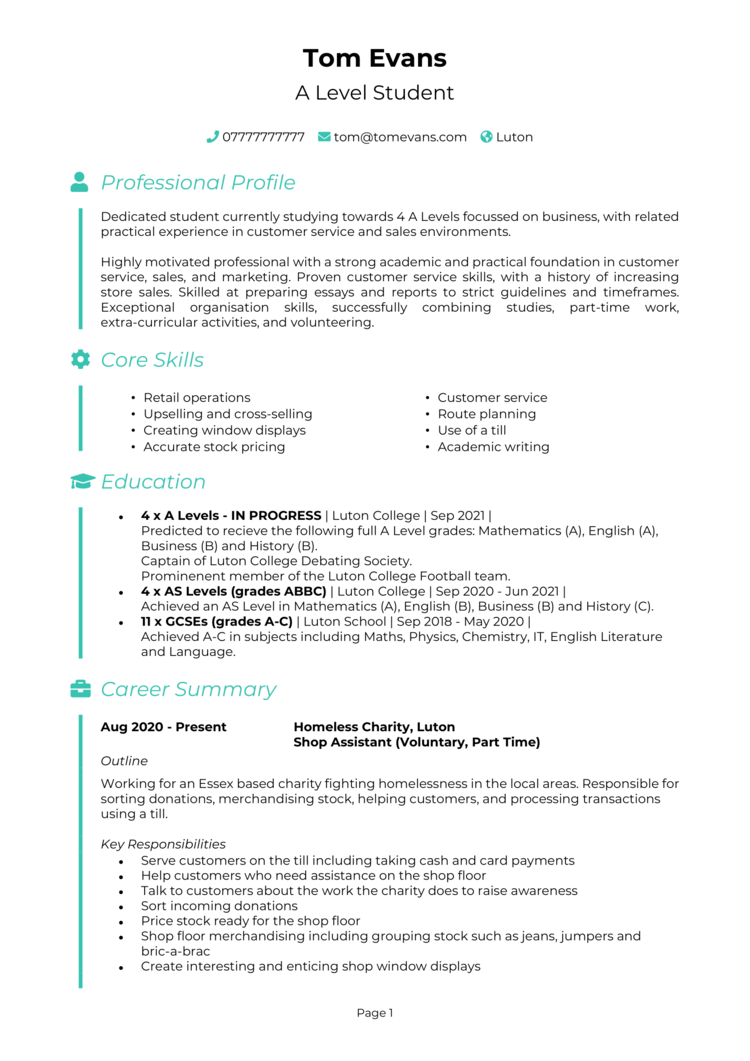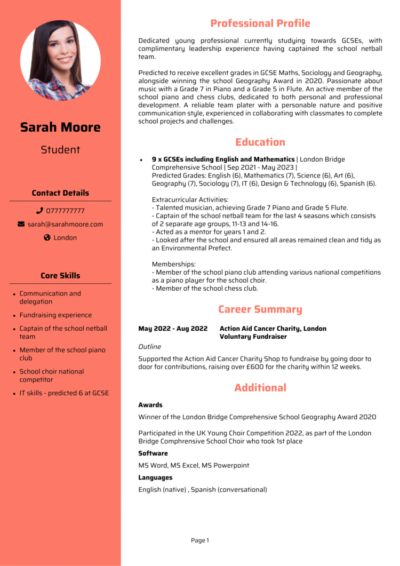Leaving school and stepping into the working world can feel like a daunting challenge.
Whether you’re diving straight into employment or searching for an apprenticeship, your CV is your first chance to prove your potential. But here’s the good news: you don’t need years of experience to create a compelling CV – you just need to know how to showcase your skills and enthusiasm.
This guide, complete with School Leaver CV examples, will help you craft a CV that highlights your existing abilities and aspirations to get you noticed by recruiters.
School Leaver CV (with no experience)

School Leaver CV (with part-time experience)

A-Level Student CV example

How to write your School Leaver CV
Learn how to create your own interview-winning School Leaver CV with this simple step-by-step guide.
Writing a School Leaver CV might seem tricky if you’re just starting out, but it’s all about showing off what you can bring to the table. Your CV should highlight your skills, academic accomplishments, and all the experience you’ve gained along the way.
This guide will help you emphasise your potential and write your application to land the role or apprenticeship you’re after.
How to structure your School Leaver CV


Your CV layout should be as straightforward as a school timetable (minus the algebra and geography you’re never going to use). Keep things clear and logical so recruiters can easily see your strengths.
Here’s how to structure your School Leaver CV:
- Name and contact details – Place personal details at the top so employers can get in touch easily. Including a photo isn’t required.
- Profile – Also known as your personal statement, summarise your education, key skills, and enthusiasm for starting your career.
- Core skills – Briefly list those transferable abilities like teamwork, communication, and time management, which make you a suitable candidate for the role.
- Work experience – Provide a detailed breakdown of any part-time jobs, volunteering, or school projects, in reverse chronological order.
- Education – Focus on your GCSEs, A-levels, or equivalent qualifications.
- Additional info – It’s highly recommended you mention hobbies and interests, awards, or extracurricular activities that demonstrate your initiative or teamwork.
The correct format for a School Leaver CV


Your CV should reflect your potential and be easy to read. Even if your experience is a little light, avoiding formatting mistakes can make it shine brighter than a student’s perfect attendance certificate.
Here’s how to format your School Leaver CV:
- Bullet points – Break down information for quick reading and clarity.
- Divide sections – Use clear headings to make navigation simple for busy recruiters.
- Use a clean font – Keep in mind to prioritise readability with a simple, professional font.
- Keep it the right length – Keep it no more than 2 pages, but make sure to include everything important.
School Leaver CV profile


Your profile, also known as your personal statement, is your opportunity to show recruiters what you’re all about. Highlight your education, key skills, and your enthusiasm for learning and contributing to a team.
School Leaver CV profile examples
Profile 1
Motivated and hardworking School Leaver with strong GCSE results, including A grades in English and Mathematics. Looking to begin a career in administration, leveraging excellent organisational skills and a keen eye for detail. Completed work experience in a local office, assisting with data entry and filing, which developed a solid foundation in professional workplace practices. Eager to contribute to a dynamic team while continuing to develop key skills such as communication and problem-solving.
Profile 2
Enthusiastic and reliable School Leaver with a keen interest in customer service roles. Recently finished GCSEs, achieving grades including B in Business Studies and Distinction in ICT. During part-time work in a retail store, gained valuable experience assisting customers, managing inventory, and handling transactions. Passionate about delivering excellent service and seeking opportunities to grow in the retail or hospitality industry, where teamwork and adaptability are key.
What to include in your School Leaver CV profile
Here are some tips on what to include in your School Leaver CV profile:
- Where you’ve studied – Mention your school and the qualifications you’ve earned.
- Your top qualifications – Highlight GCSEs, A-levels, or equivalent achievements.
- Work experience – Mention as much work as you have, even if they were unpaid or small roles.
- Key skills – Include strengths like communication, teamwork, or problem-solving.
- Career goals – Briefly outline what you’re looking for in your first role, apprenticeship, or university course.
- Extracurricular involvement – Reference activities that demonstrate initiative or leadership, like sports or school councils.
Core skills section


Your core skills section is like your CV’s highlight reel, showing off your best abilities in a quick and easy-to-read format.
For School Leavers, this might include transferable skills like time management, communication, or problem-solving. Tailor these to the role you’re applying for to make the strongest impression.
Struggling to create your first CV after leaving school?
Try our CV builder – it’s packed with beginner-friendly templates, expert advice, and pre-written content to help you highlight your skills and potential.
Most valuable skills for a School Leaver CV
- Teamwork – Collaborating with others on group projects, sports teams, or school activities.
- Time Management – Meeting deadlines and balancing schoolwork with extracurricular commitments.
- Problem-Solving – Thinking critically to resolve challenges in studies or activities.
- Communication – Writing clearly and speaking confidently in presentations or discussions.
- Adaptability – Thriving in new situations, such as transitioning to work or handling change.
- Organisational Skills – Managing schedules, tasks, or events effectively.
- IT Proficiency – Familiarity with tools like Microsoft Office or Google Workspace.
- Leadership – Taking charge of school projects, events, or team activities.
- Customer Service – Experience gained from part-time jobs or volunteering roles.
- Initiative – Showing a proactive approach to learning or problem-solving.
Structuring your education section


The education section is the centrepiece of your CV, as it showcases your hard-earned academic achievements. Focus on your GCSEs, A-levels, or whatever else you’ve graduated with, and include any standout results or relevant coursework.
Provide more detail to your most recent and most relevant qualifications: mention the modules, essays, or course projects that matter the most to the role you’re applying for. List your qualifications in reverse chronological order, starting with the most recent..
Example education sections
Education 1
4 x A Levels (grades AABC) | Manchester Sixth Form College | Sep 2020 – Jun 2022
Mathematics, Biology, Physics, Computing
Achieved high grades across STEM and creative subjects, demonstrating strong analytical and problem-solving abilities alongside a creative mindset. Regularly contributed to group projects and participated in college-level academic competitions.
12 x GCSEs, grades A-B | St. Mary’s High School | Sep 2015 – Jun 2020 Including English (A), Mathematics (A), and Science (A).
Excelled in a range of subjects, with particular strengths in analytical and written disciplines. Actively involved in extracurricular activities, such as the Science Club and the school newsletter.
Education 2
BTEC Level 3 Diploma in Business (grades Distinction, Merit) | London College | Sep 2016 – Jun 2018
Developed practical knowledge in business fundamentals, including marketing, finance, and project management. Completed a work placement as part of the programme, gaining hands-on experience in office administration.
8 x GCSEs, grades B-D | London School | Sep 2011 – Jun 2016
Including English (C) and Mathematics (C).
Focused on developing skills in communication and numeracy. Took part in a school-led community project, where teamwork and problem-solving were essential to its success.
What to include in your education section
For each qualification, add the following info:
- Qualification & organisation – The name of your school and each of the most important and recent courses.
- Dates studied – The date you began the course, and the date you earned the qualification.
- Extra details – If it’s a recent and relevant course, detail some of the most important skills and experience you gained from it. That could include modules, essays, or things you learned: ideally, tailor it for the job you’re going for.
Best qualifications for School Leavers
- GCSEs – Foundational qualifications in subjects like Maths, English, and Science.
- A-levels or Equivalent – Advanced qualifications in specific subjects relevant to your career goals.
- Level 2 Certificate in IT User Skills – Demonstrates proficiency in essential computer applications.
- First Aid Training Certification – Shows knowledge of emergency response protocols.
- BTEC Level 2 Diploma – Offers vocational training in areas like business, IT, or engineering.
How to showcase your work experience in your CV


Your work experience section is where you show recruiters how you’ve applied your skills in real-life situations. Even if you have no work experience beyond babysitting or helping out at the school fair, don’t underestimate its value. Recruiters love initiative!
List your experiences in reverse chronological order, unless there are especially relevant things that need emphasising.
Focusing on transferable skills and contributions. And yes, teamwork on the football pitch absolutely translates to collaboration in the workplace.
How to structure jobs

- Outline – Briefly describe the role, the organisation, and your main focus in the position.
- Responsibilities – Highlight tasks like assisting customers, managing schedules, or collaborating with teams. Use action verbs like “helped,” “organised,” or “coordinated.”
- Achievements – Mention outcomes, such as positive feedback or successfully completing a project. Numbers or measurable results can make your impact even clearer.
Example jobs for School Leaver
Admin Intern | BrightStart Solutions
Outline
Supported administrative tasks during a week-long work experience placement in a corporate office, gaining practical skills and insight into professional environments.
Responsibilities
- Assisted with filing, photocopying, and organising documents for the team.
- Entered data into spreadsheets, ensuring accuracy and timely updates.
- Shadowed office staff to learn scheduling and meeting preparation.
- Answered phones politely and directed inquiries to appropriate colleagues.
- Prepared a report summarising work completed during the placement.
Achievements
- Received positive feedback from the manager for attention to detail and eagerness to learn.
- Improved office efficiency by organising misfiled records.
- Demonstrated professionalism and reliability throughout the experience.
Volunteer | Helping Hands Charity Shop
Outline
Volunteered at a local charity shop, gaining experience in retail operations and teamwork while contributing to the community.
Responsibilities
- Welcomed customers warmly and assisted them with queries about products.
- Organised donated items and ensured displays were tidy and appealing.
- Processed sales at the till and handled cash transactions.
- Priced donated goods, ensuring fair and competitive pricing.
- Supported the team with maintaining shop cleanliness and efficiency.
Achievements
- Developed strong interpersonal skills through regular customer interactions.
- Improved shop organisation, increasing daily sales by 10 percent.
- Commended by the shop manager for dedication and enthusiasm.
Additional info


At the bottom of your CV is an optional section for any additional information that might be useful in the role you’re applying for.
As a school leaver, this should be a fairly comprehensive section to help make up for your relatively little experience: list anything you think will show that you’re a good fit for the role.
Good additional info for School Leavers
- Hobbies – Whether you play sports or build websites, these will show anything from teamwork to computing skills.
- Interests – Depending on what job you’re going for, an interest in, for example, global affairs or technology might help prove your genuine enthusiasm for the role.
- Volunteer work – These are always good to showcase your values and initiative, things which any recruiter would place great value on.





